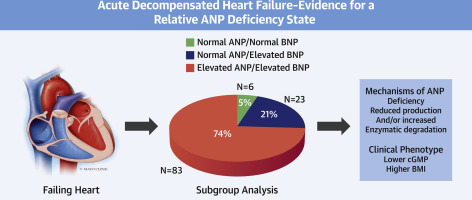JACC: Heart Failure ( IF 10.3 ) Pub Date : 2019-09-11 , DOI: 10.1016/j.jchf.2019.05.012 Shawn H Reginauld 1 , Valentina Cannone 2 , Seethalakshmi Iyer 1 , Christopher Scott 3 , Kent Bailey 3 , Jacob Schaefer 1 , Yang Chen 1 , S Jeson Sangaralingham 4 , John C Burnett 4

|
Objectives
This study investigated the differential regulation of circulating atrial natriuretic peptide (ANP) and B-type natriuretic peptide (BNP) in patients with acute decompensated heart failure (ADHF) and tested the hypothesis that a relative deficiency of ANP exists in a subgroup of patients with ADHF.
Background
The endocrine heart releases the cardiac hormones ANP and BNP, which play a key role in cardiovascular (CV), renal, and metabolic homeostasis. In heart failure (HF), both plasma ANP and BNP are increased as a compensatory homeostatic response to myocardial overload.
Methods
ANP and BNP concentrations were measured in a small group of patients with ADHF (n = 112). To support this study’s goal, a total of 129 healthy subjects were prospectively recruited to establish contemporary normal values for ANP and BNP. Plasma 3′,5′cyclic guanosine monophosphate (cGMP), ejection fraction (EF), and body mass index (BMI) were measured in these subjects.
Results
In cases of ADHF, 74% of patients showed elevated ANP and BNP. Importantly, 26% of patients were characterized as having normal ANP (21% of this subgroup had normal ANP and elevated BNP). Cyclic GMP was lowest in the ADHF group with normal levels of ANP (p < 0.001), whereas BMI and EF were inversely related to ANP levels (p = 0.003).
Conclusions
Among a subgroup of patients hospitalized with ADHF, the presence of an ANP deficiency is consistent with a differential regulation of ANP and BNP and suggests the existence of a potentially compromised compensatory cardiac endocrine response. These findings have implications for the pathophysiology, diagnostics, and therapeutics of human HF.
中文翻译:

急性失代偿性心力衰竭中 ANP 和 BNP 的差异调节:ANP 缺乏。
目标
本研究调查了急性失代偿性心力衰竭 (ADHF) 患者循环心房利钠肽 (ANP) 和 B 型利钠肽 (BNP) 的差异调节,并检验了 ANP 相对缺乏存在于心衰患者亚组中的假设。多动症。
背景
内分泌心脏释放心脏激素 ANP 和 BNP,它们在心血管 (CV)、肾脏和代谢稳态中起关键作用。在心力衰竭 (HF) 中,血浆 ANP 和 BNP 作为对心肌超负荷的补偿性稳态反应而增加。
方法
在一小群 ADHF 患者 (n = 112) 中测量了 ANP 和 BNP 浓度。为了支持这项研究的目标,前瞻性招募了 129 名健康受试者,以建立 ANP 和 BNP 的当代正常值。在这些受试者中测量血浆 3',5' 环磷酸鸟苷 (cGMP)、射血分数 (EF) 和体重指数 (BMI)。
结果
在 ADHF 病例中,74% 的患者显示 ANP 和 BNP 升高。重要的是,26% 的患者 ANP 正常(该亚组中 21% 的 ANP 正常而 BNP 升高)。ADHF 组的循环 GMP 最低,ANP 水平正常(p < 0.001),而 BMI 和 EF 与 ANP 水平呈负相关(p = 0.003)。
结论
在 ADHF 住院患者的亚组中,ANP 缺乏与 ANP 和 BNP 的差异调节一致,表明存在潜在的心脏代偿性内分泌反应受损。这些发现对人类 HF 的病理生理学、诊断和治疗具有重要意义。











































 京公网安备 11010802027423号
京公网安备 11010802027423号